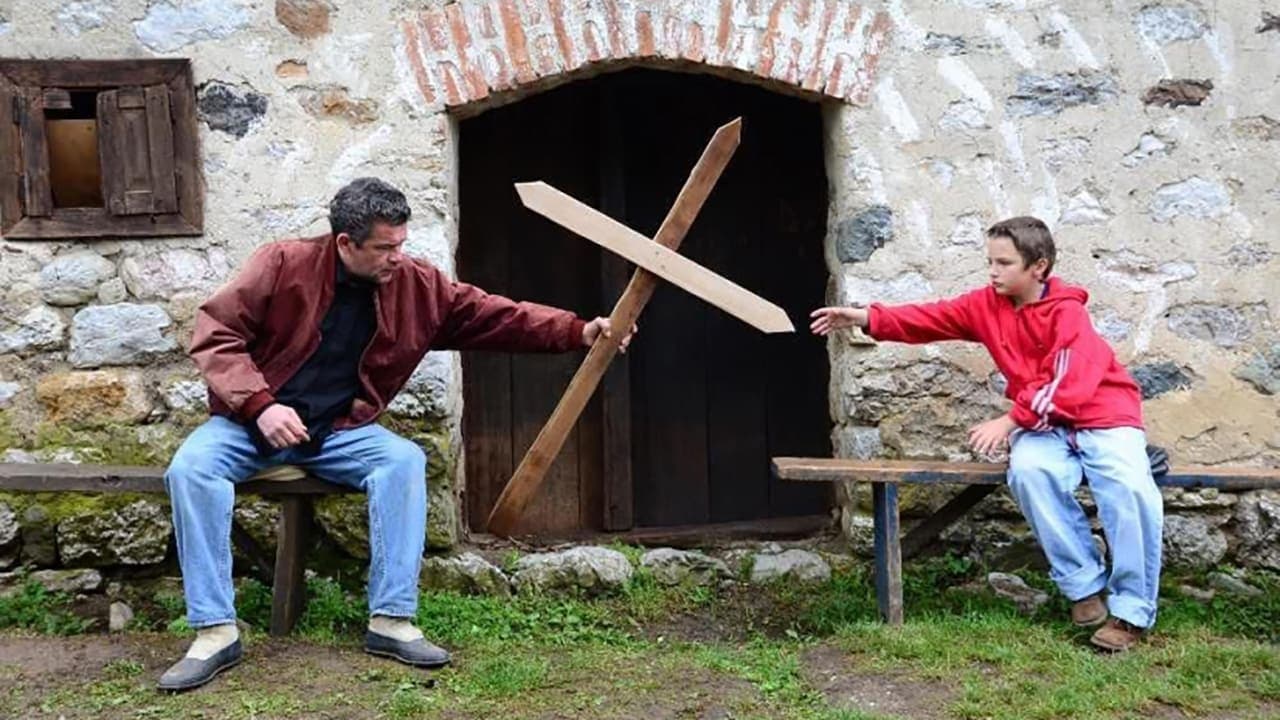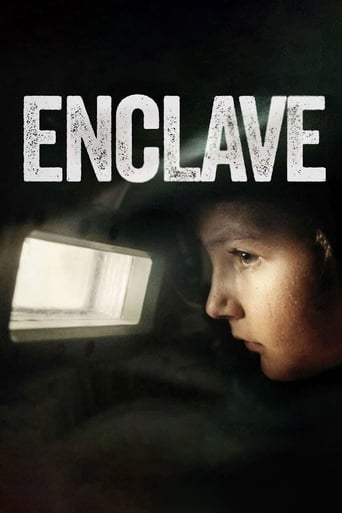

An anti war movie set in the Kosovo region of Serbia. Its about the minority Christians living in a remote village. The others are moved out from there except a family of three - a boy, his father and grandfather who lived there for generations refused to leave. The movie depicted the threat they are faced every day in their life. But the tale was seen through the boy's eye as he's the only one kid from his community with no friends.Co-produced by Germany, it was sent to represent Serbia for the 2016 Oscars. It was a slow beginning, but ended on a high note. A sensitive theme, but very well made movie. It is hard to imagine living a life in this part when it was surrounded by conflict that can burst out anytime. To move around the places, you need a protector, an armored vehicle to transport.Actually the movie won't show any major violences, especially the face-off between two ethnic groups. Maybe that's for the best and to avoid fresh intrigue. The film aimed to spread peace message through the friendship. So the story focused mainly on the kids and their perspective on the issue. But that's not at all, to the end, the narration shifts to a different location and lets us know how the past follows them to haunt the rest of their life."Tell the bishop that if he's a true Serb he should not be afraid. He can saddle his horse, won't ride in that armored vehicle."It was a 90 minute long movie, yet I felt it ended very early. Because the pace was good and only due to the realistic approach it looked kind of dull, but all the way it engaged with the story development and with the new characters till the final act. Very interesting story progress, for every few minutes it begins to take a new turn, so hard to guess where it is heading or how it's going to end. The lines were calm and cool, even the shoutings, but when I suddenly hear gunshots, that's really aloud and created a severe panicking atmosphere like that something wrong might going happen. Reason for that is, the place was kind feels peaceful zone, at least for us as the viewers who don't know the earlier events.I liked the kids' performances, obviously the boy in the lead. It is a children's movie, because they acted in it, but the theme is a little strong for the kids to watch, I think PG required. The location was great, the camera work was excellent, some of the distant shots and its angles were so good. The overall movie was better than I anticipated, especially the third act was a lot more suspenseful, but kind of displeased with the editing in that part. Because they aimed for a twist to present scenes in the non chronological order. I think that was unnecessary for a this smoothly going narration, but it was not that bad at all.Actually, I took some time to realise how good it was, only after a quick recap about what I saw and to guess what the filmmaker is trying to say. Believe me, initially I thought it was a decent, but was way better and I think a fine message deliverer. It is a little unheard movie for many of us from the southeast Europe, yet worth a try once you came to know about it.8/10
... View MoreGoran Radovanovic pulls Enclave toward an inexorably tragic conclusion but pulls back to find redemption. Three characters find redemption. The Serbian boy Nenad survives near-death — buried under the new church bell in a burning tower — to make a new life in the multicultural Belgrade. His father Milena comes in from the embittered alcoholic's cold to help his son make that new life. The vengeful Albanian shepherd Baskim finds a conscience just in time to save Nenad's life.If the isolated, fragile Christian church bell tower expresses the vulnerability of that ethnic minority in Kosovo, four years after the war, Baskim's role as shepherd carries both Christian and poetic connotations. The shepherd is traditionally the figure of pastoral innocence and purity, but here the Serbs' murder of his father has turned him into a violent malevolence. The shepherd is also Jesus, of course, so Baskim and the church bell frame the climax in Christian terms. The film details the tensions between the Albanian community and the small Serbian enclave that barely survives in the antagonistic ethos. Armoured tanks convey the citizens between the two zones' borders. The boys are raised into their fathers' war, until Nenad's hunger for friendship — any friendship, even with the Albanian toughs — draws him into the Albanian "society" and Baskim discovers the error of his anger.Writer/director Radovanovic himself plays the Serb who joins the Albanian multi-ethnic police force, placing the larger peace-keeping role ahead if his ethnic identity. His conversion is not guilt-free. That compromise Milena spurns on principle. But the ethic of the film promotes the suspension of ethnic wars in favour of rediscovering our common brotherhood. Hence the Christian framework.The happy ending is not a sell-out. Rather, it points a way out of the self-perpetuating rage and murders that poison and destroy the idealists in any civil war. This story of redemption is more constructive than the tragic conclusion would have been. The grandfathers are dying or unchangeable, the fathers are disillusioned and impotent, so to the children fall the need and hopes for peace. Hence the interweaving of the Serbian grandfather's death and funeral with the Albanian's supervision of his grandson's wedding. The cycle of community trumps the cycle of violence.
... View MoreCHILDREN ARE WATCHING USAbout the narrative in the feature film "The Enclave" by Goran RadovanovićThe surreal daily life of the Serbian civilians in the rare enclaves in present-day Kosovo can potentially represent an extraordinarily inspiring theme for filmmakers. Despite that, with the exception of several courageous documentary reports (recorded immediately after the arrival of KFOR and the first pogroms against Serbs in the southern province in 1999 and 2000) - so far only Sonja Blagojević, in her feature-length documentary Kosma filmed in 2013, tackled the complicated task of covering this topic in a concrete, feature film form. Goran Radovanović goes back to this issue in an entirely different form of a feature film with his The Enclave resulting from a Serb-German co-production, and completed in 2014. The boy who observes daily his homeland through the oblong little window of a KFOR armored personnel carrier that Italian troops drive him in to and from school; the deserted Serbian school attended by just one pupil, which definitely closes down when the last remaining teacher leaves; the constant feeling of anxiety and danger that the remaining, rare Serbs - tracked by the cross-hairs of automatic weapons - have grown accustomed to, just as they have to the air they breathe, are all motifs taken from the painful reality that the author skillfully blends into a unique and rounded narrative of his feature film. From compelling, factual scenes of everyday life reactivated archaic forms stand out, two ritually and mythically founded motives which also constitute the backbone of the plot and the background for the culmination and the denouement of Radovanović's film: the death and the burial of the oldest member of the Serbian household, and the engagement and the wedding in a neighboring Albanian home. Still, key momentum to the plot is given by the motive of the need sensed by the lonely Serb boy (played by Filip ubarić) to play with his Albanian peers (Denis Murić, Nenad Stanojković and Milan Sekulić). It's an unusual game: dangerous and full of mistrust, but soon enough harmless too; a game between enemies, guided by specters of the past which occasionally allows - thorough children's oblivion for reality, to tear down barriers of centuries old intolerance and carefully cultivated hatred. Their relationship, evolving in the playing field unfenced by crude reality, reflects in a weird, twisted way the rapport of their parents and of the feuding ethnic groups. In the constant and dizzying ambiguity of the game, the narrative resists the temptation to slip into non-reality of fairy tales, or into cheap and pathetic "politically correct" propaganda on coexistence and tolerance. In the critical moment, the legacy of hatred and traumas from the recent past will still burst out from the playful boys - and after this dramatic culmination, The Enclave is resolved through a non-linear, skipping and mosaic, fully unconventional narrative which harbors the greatest value and the salient feature of Radovanović's new film. With a precise as well as unusual and unpredictable combination of parallel editing with flash-forwards and deliberate omission of important segments of the plot, the author compiles - with the great help of the editor Andrija Zafranović (whose contribution to this film exceeds by far the usual professional parameters) - the entirety using an approach and a form of narration typical of artistic films. Because the effect of the chosen non-linear, elliptical and leaping storytelling in the final third of The Enclave is not used up just in the stressed tension and drama in the suggestiveness of scenes that amplify the empathy of the viewers with the drama of the protagonist, the ten-year-old boy Nenad. Along with the emphasized catharsis, this approach also brings, in the film finale, undeniable poetic qualities, unusualness and revived secrecy of reality that emerges from the decomposed infantile experience of the adult world. David Lynch lucidly noted in an interview that childhood is a sort of drunkenness and ontological intoxication with the world and life, and The Enclave discretely gives us back that experience, suggesting it with its very structure, and thoughtfully selected and executed storytelling strategy.Srdjan Vučinić
... View MoreEnklava is a great movie which very realistically shows the life on Kosovo,province of Serbia.It doesn't stand on neither side,nor Serbian,nor Albanian.It just shows the rough life that it is.Great performance from one of the best Serbian actors Nebojsa Glogovac.Very lovable roles of a Serbian and the Albanian boys.Anica Dobra has a good performance as Vojas(Glogovac) sister who fled to Belgrade.The end is very heartbreaking as it shows young boy Nenad who moved to Belgrade and his first day in new school and the children who make jokes of him and don't understand what he has been through.Movie is very deep and moving,it really makes you think about all the benefits of your life and the horror of war.
... View More